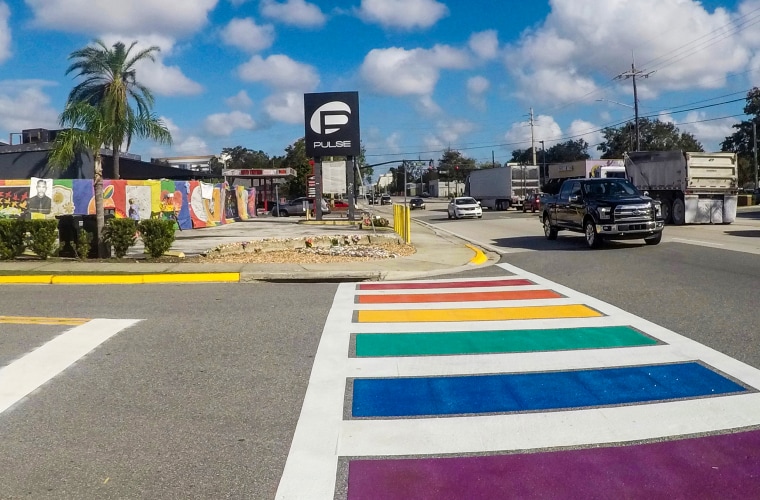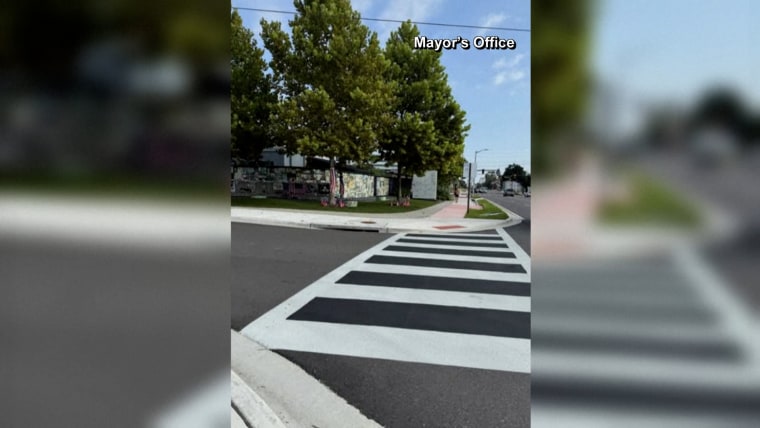A rainbow crosswalk in Orlando, Florida, that was part of the city’s Pulse Memorial was painted over by the state late Wednesday night.
The memorial honored the 49 people fatally shot by a gunman at the Pulse LGBTQ nightclub in 2016, in what was the largest mass shooting in the country at the time.
Orlando Mayor Buddy Dyer criticized the removal of the crosswalk on social media, calling it a “cruel political act.”
“We are devastated to learn that overnight the state painted over the Pulse Memorial crosswalk on Orange Avenue,” he wrote. “This crosswalk not only enhanced safety and visibility for the large number of pedestrians visiting the memorial, it also served as a visual reminder of Orlando’s commitment to honor the 49 lives taken.”
Dyer added that the crosswalk adheres to safety standards and was actually installed by the state. It was created in 2017.
Brandon Wolf, one of the Pulse shooting’s surviving victims, said the removal was a desecration of the deceased victims’ memories.
“In the dark of night, they came to erase our show of solidarity, our declaration that we will never forget,” Wolf wrote on X. “The cowards who feel threatened by our lives should feel lucky they didn’t have to bury the ones they love — then watch the state come & desecrate their memory.”
When asked for comment, the office of Gov. Ron DeSantis pointed to his remarks on social media Thursday afternoon. In response to a video of Democratic state Sen. Carlos Guillermo Smith criticizing the rainbow crosswalk’s removal, DeSantis wrote on X: "We will not allow our state roads to be commandeered for political purposes."

A spokesperson for the Florida Department of Transportation said in an emailed statement that the department has a duty to “ensure the safety and consistency of public roadways and transportation systems” and therefore ensure “roadways are not utilized for social, political, or ideological interests.”
The statement noted that the department updated its guidelines earlier this year to prohibit nonuniform “traffic control devices,” including pavement markings, and that the new policy permits the department to withhold funds from local governments that don’t comply.
“FDOT completed a review of all state-maintained roadways and is now correcting pavement markings not in compliance. That includes street art previously installed on state right of way, such as the intersection of Orange Avenue in question,” the statement continued. “In this case, while the crosswalk has been restored to its proper form, local efforts are underway to construct a permanent memorial on adjacent properties funded by the State of Florida.”
The crosswalk’s removal follows a directive last month from President Donald Trump’s transportation secretary, Sean Duffy. On July 1, Duffy sent a letter to all 50 states, along with Washington, D.C., and Puerto Rico, about roadway safety that stressed “consistent” roadway markings that are “free from distractions.” In a social media post that same day, Duffy shared the letter along with a message taking direct aim at rainbow crosswalks, which are typically intended to symbolize LGBTQ Pride.
“Taxpayers expect their dollars to fund safe streets, not rainbow crosswalks,” he wrote. “Political banners have no place on public roads. I’m reminding recipients of @USDOT roadway funding that it’s limited to features advancing safety, and nothing else. It’s that simple.”
Hours after the rainbow crosswalk's removal, a dozen or so people got on their hands and knees in to color in the recently paved over street art with multi-colored chalk, according to WESH-TV, NBC's local Orlando affiliate. Afternoon storms, however, washed it away.

